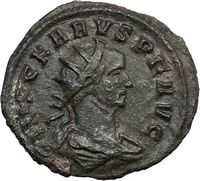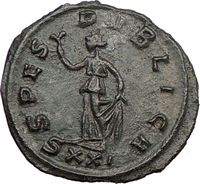Carus Roman Emperor 282-283AD Biography and Authentic Ancient Coins
Available for Sale from Trusted Ancient Coin Dealer
Buy ancient coins of Carus who was a Roman senator turned emperor, whom
established a dynasty with his son Numerian and Carinus. He worked to
restore the strenght of the empire as the previous emperors Aurelian and
Probus did. You can explore a selection of authentic ancient coins of
this emperor at my online coin shop, based on eBay where you can place
offers on the amount you would like to pay to get the absolute best
deals possible online. All coins you purchase from his store are
professionally researched, photographed and provided with a lifetime
guarantee of authenticity. They also come complete with a signed,
full-color, custom professionally-done CERTIFICATE of AUTHENTICITY, a
$50-$100 value, absolutely Free. Visit his website and explore a
selection of thousands of certified authentic ancient Greek, Roman,
Biblical, Byzantine coins, artifacts and beyond. A fun way to learn
about and preserve history for future generations.
 
Example of Authentic Ancient
Coin of:
Carus - Roman Emperor: 282-283 A.D. -
Bronze Antoninianus Ticinum mint: 282-283 A.D.
Reference: Unpublished Type
IMP C KARVS P F AVG, radiate draped bust right.
SPES PVBLICA, Spes walking left with flower & raising robes, SXXI in
exergue.
* Numismatic Note: Interesting to note that the
obverse has KARVS instead of CARVS on the obverse, makes me come to the
conclusion that the celator (die maker) may have been of Greek origin
and used the Hellenized K instead of C for the obverse inscription. It
is possible that this is an unpublished type with the obverse and
reverse inscriptions. Of excellent quality.
In
Roman mythology, Spēs was the
goddess of hope. She was traditionally defined as "the last goddess" (Spes,
ultima dea), meaning that hope is the last resource available to
men. There was a temple to her in the
Forum Holitorium. In art, Spes was
depicted hitching her skirt while holding a
cornucopia and
flowers. Spes personified hope for good
harvests, and for children, and was invoked at births, marriages, and
other important times. Her Greek equivalent was
Elpis.
Marcus Aurelius Carus (c. 230 - late
July/early August, 283) was a
Roman Emperor (282-283). During his
short reign, Carus tried to follow the path of restoration of the empire
strength marked by
Aurelian and
Probus. His sons
Carinus and
Numerian formed, with Carus, a short
lived dynasty, which granted further stability to a resurgent empire. He
also had a daughter Aurelia Paulina.
Biography
Carus, whose name before the accession may have been
Marcus Numerius Carus, was born, probably, at
Narbo (modern Narbonne) in Gaul,[1]
but was educated at
Rome. He was a
senator, and had filled various civil
and military posts before he was appointed
prefect of the
Praetorian Guard by the emperor Probus
in 282. After the murder of Probus at
Sirmium, Carus was proclaimed emperor
by the soldiers. Although Carus severely avenged the death of Probus, he
was himself suspected of having been an accessory to the deed. He does
not seem to have returned to Rome after his accession, but contented
himself with an announcement of the fact to the Senate.
Bestowing the title of
Caesar upon his sons Carinus and
Numerian, he left Carinus in charge of the western portion of the
empire, and took Numerian with him on the expedition against the
Persians which had been contemplated by
Probus. Having defeated the
Quadi and
Sarmatians on the
Danube, Carus proceeded through
Thrace and
Asia Minor, annexed
Mesopotamia, pressed on to
Seleucia and
Ctesiphon, and carried his arms beyond
the
Tigris. The
Sassanid Emperor
Bahram II limited by internal
opposition, could not effectively defend his territory. For his
victories, which avenged all the previous defeats suffered by the Romans
against the Sassanids, Carus received the title of Persicus Maximus.
Carus hopes of further conquest were cut short by his death. One day,
after a violent storm, it was announced that he was dead. His death was
variously attributed to disease, the effects of
lightning, or a wound received in a
campaign against the
Persians. The facts that he was leading
a victorious campaign, and that his son Numerian succeeded him without
opposition, suggest that his death may have been due to natural causes.
|